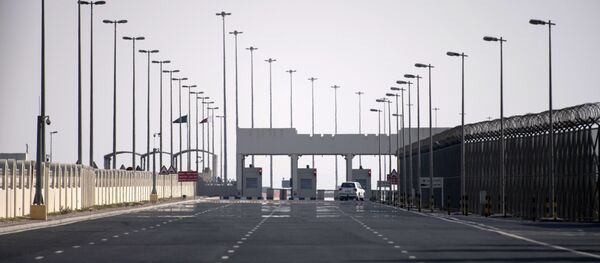The four-legged, humped regional commodity has now found itself at the center of what many consider to be the most urgent diplomatic crises in the Middle East in decades, as — alongside a complete blockade of the country — Riyadh has issued a decree demanding that any and all Qatari camels grazing on the kingdom's royal pastureland be deported, or at least turned back across the border.
Responding to the furry furore, Qatari officials have set up emergency water facilities and food stalls for the errant beasts, and have estimated that some 15,000 ships of the desert and an estimated 10,000 wandering sheep have been rounded up and returned home.
Qatar, at some 4,400 square miles, needs pastureland, and Saudi Arabia, at some 830,000 square miles, has the space and then some to spare.
Traditionally, Qatari shepherds have been allowed to pasture their animals on the kingdom's territories. In the wake of an increasingly hostile tone taken by Riyadh toward Doha over vague accusations that the tiny nation supports global terrorism, however, even those tacit permissions have been rescinded.
Following a state visit to Riyadh by US President Donald Trump last month, the kingdom — noting its reestablishment as America's number one trading partner in the Arab world — has flexed its geopolitical muscle.
Saudi Arabia's ongoing war in Yemen has been ramped up with the purchase of new US weapons, and now, seeking to deflect attention from increasing evidence that members of the Saudi royal family have supported terrorist actions on US soil in the past, Riyadh has demanded that tiny Doha end its diplomatic alliance with Iran.
Saudi Arabia, along with several other Middle Eastern states, on June 5 cut diplomatic ties with Qatar and imposed economic and commodities sanctions upon the nation, including blockading seaports, airports and roads, preventing much needed medical supplies and food from entering.
Qatar has rejected accusations of aiding and abetting terrorism, noting that it is currently an active member of the US-led coalition to defeat Daesh in the region.
The US has adopted a hands-off approach to the regional crisis, although reports suggest that Washington's desire to put pressure on Tehran is at the heart of Riyadh's ongoing aggression toward Doha.
Qatari shepherds are understandably disappointed.
"We just want to live out our days, to go to Saudi Arabia and take care of our camels and go back and take care of our family," said one Qatari shephard, cited by Reuters.
"We don't want to be involved in these political things," he added.



